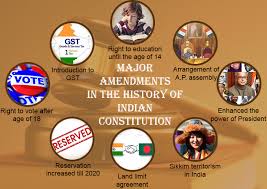The Constitution of India is known as a living document because it can be changed or amended according to the needs of time and society. Amendments help in improving and updating the Constitution to suit the changing needs of the country.
The power to amend the Constitution is given in Article 368 of the Indian Constitution.
What is a Constitutional Amendment?
An Amendment means making changes, adding new provisions, or deleting some parts from the Constitution.
Dr. B.R. Ambedkar called the Constitution “flexible enough to adjust to changing conditions.”
Types of Amendments in Indian Constitution
According to Article 368, amendments can be done in 3 ways:
1. Simple Majority Amendment
-
Passed by a simple majority of members present and voting in Parliament.
-
Examples: Creation of new states, changes in state boundaries.
2. Special Majority Amendment
-
Requires a special majority (more than 50% of total members + 2/3rd of members present and voting).
-
Used for most Constitutional Amendments.
3. Special Majority with Ratification by States
-
Requires approval from half of the state legislatures in addition to a special majority in Parliament.
-
Used for matters related to federal structure, elections, powers of the President and Governor, etc.
Important Constitutional Amendments of India
1st Amendment Act, 1951
-
Added restrictions on freedom of speech and expression.
-
Added 9th Schedule to protect certain laws from judicial review.
42nd Amendment Act, 1976 — Mini Constitution
-
Added words Socialist, Secular, and Integrity in the Preamble.
-
Strengthened the power of the central government.
-
Made DPSP more powerful.
44th Amendment Act, 1978
-
Restored fundamental rights taken away during Emergency.
-
Made it difficult to declare a National Emergency.
61st Amendment Act, 1989
-
Reduced the voting age from 21 years to 18 years.
73rd Amendment Act, 1992
-
Provided Constitutional status to Panchayati Raj (rural local government).
74th Amendment Act, 1992
-
Provided Constitutional status to Municipalities (urban local government).
86th Amendment Act, 2002
-
Made Right to Education a Fundamental Right for children aged 6 to 14 years (Article 21A).
101st Amendment Act, 2016
-
Introduced Goods and Services Tax (GST) — One Nation, One Tax.
103rd Amendment Act, 2019
-
Provided 10% reservation to Economically Weaker Sections (EWS) in education and jobs.
Importance of Constitutional Amendments
-
Protect democracy and fundamental rights.
-
Adjust to social, political, and economic changes.
-
Strengthen unity and integrity of the country.
-
Promote social justice and equality.
